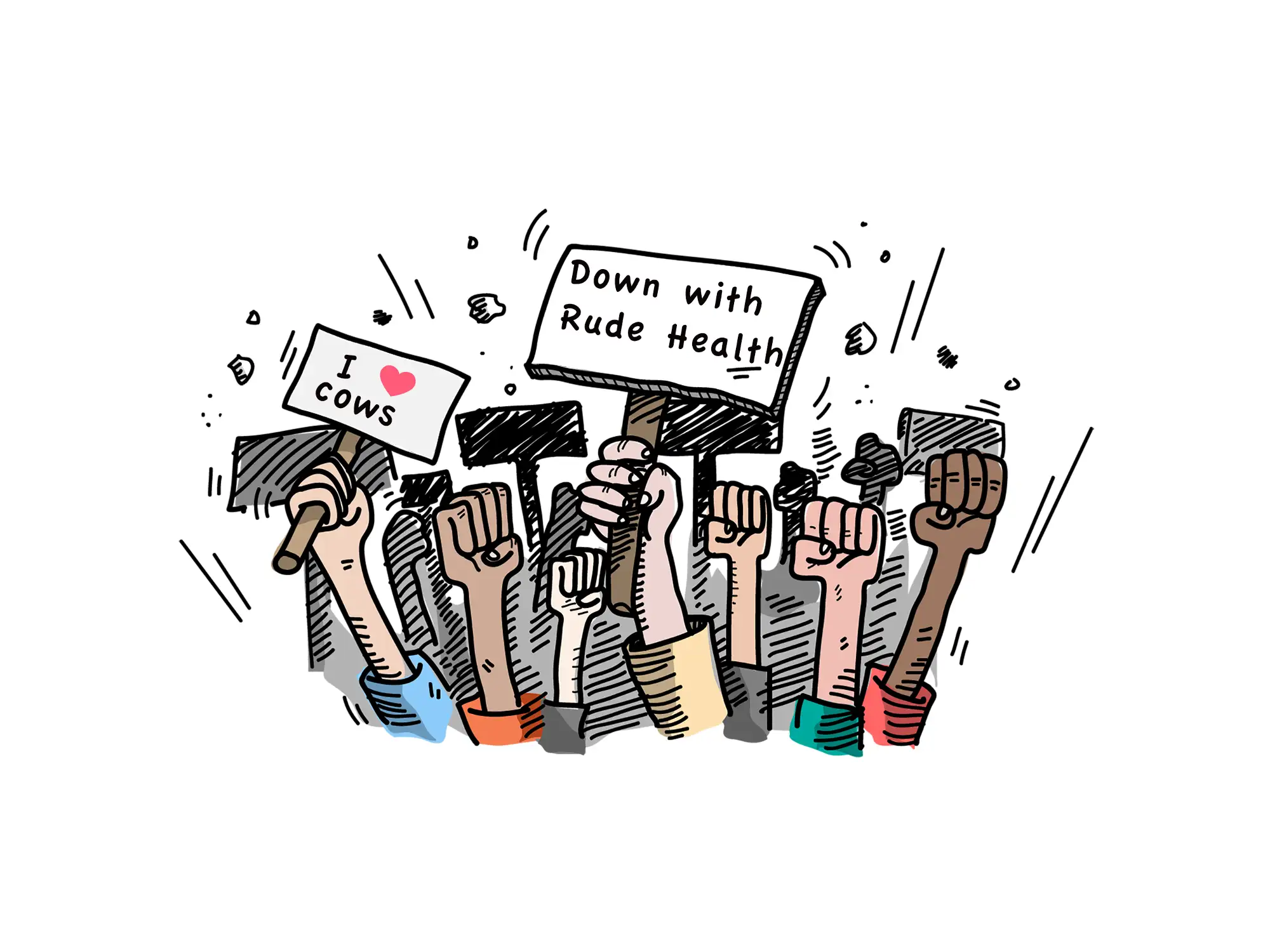Social media suicide. People are fascinated when a big brand ‘misses the mark’ with a campaign online. Rightly so too – if it’s a brand you advocate yourself, you’re within your rights to be upset or offended by messaging that goes against your beliefs or values.
However, the attention goes much further than the offending messaging itself, it’s the decision making process behind a campaign or post. People want to know why something ‘slipped through the net’, why it ‘missed the mark’ – after all, they’re the ‘culprits’ behind it.
Rude Health Controversy – ‘What were they thinking?’
This week, Rude Health hit the headlines of the Metro for causing outrage online for promoting full fat milk. So what’s the problem? Well, Rude Health produces a range of natural products including milk alternatives such as cashew and brown rice milk.
This means that, intentionally or not, they’ve built a strong vegan following who greatly, passionately oppose the dairy industry. Whoops.
Adding salt to the wound, they also recently published a blog post ‘Stay Brilliant’ as part of their ‘Rant’ series. This piece discusses cutting out food types, and controversial snippets include:
“Now it’s vegetarianism and veganism, promising to save you from cancer and early death and save the animals while you’re at it, if you believe What the Health, Okja and other propaganda films masquerading as documentaries on Netflix.”
They then further insinuate that people are vegetarian and vegan “to claim the health and moral high-ground.” Yikes.
At first look, the whole thing screams PR nightmare. It’s easy to physically cringe at the influx of disgusted loyal customers promising to boycott the brand. So, what were they thinking?
A justifiable question, and you may think they don’t appear to have done much thinking at all. But… if we dig a bit deeper, they may know exactly what they were thinking.
Outrage is Infectious
Currently, their fanbase are certain they will lose the majority of their customers.
Sample comments on their Instagram post:
“You’ve just lost all your vegan customers. Congratulations.”
“Disgraceful, won’t be buying anything from you ever again”
“Cheers to the beginning of your bankruptcy! :)”
Sample comments on their blog post:
“More examples of you being completely delusional about your own customer base – “All these regimes are defined by cutting out types of food, which is odd in itself if you aren’t forced to by an allergy” so why ** do you make plant based milks then???? You idiots think all the popularity in plant based milks is down to allergies? Are you kidding me? You’re mocking your customers, do some goddam research.”
“Wow! Mocking the very people you are trying to sell products to….. I see what you are trying to ‘rant’ about, all the different opinions on healthy eating but whoever does your marketing failed miserably!”
“Hey, Rude – can I call you Rude, or don’t we know each other well enough? Well, I suppose you’ve made it clear you don’t know me at all, even though I am in your target demographic.”
But the fact of the matter is, the engagement may be negative, but it’s huge. Just looking at the numbers on their Instagram you can see that prior to the offending post, their posts received around 5 to 20 comments. The post that’s sparked the debate? 3000+ comments.
It’s not only social engagement that has increased – Google Trends indicates an increase in search frequency for ‘Rude Health’. Just take a look at the spike during the time of the controversy:
Controversial Marketing or Social Media Mishap?
The key ingredient in the recipe for controversial marketing success is, first and foremost, the emotional response. This is done to evoke viral shares and responses as everyone wants to give their opinion on the matter. In this case, Rude Health has succeeded in this step – they’ve had a huge response.
However, the response it has provoked is very upset and angry, one that does not appear to have balanced arguments in the mix – something that controversial marketing can thrive on.
The question is, is it worth increasing your brand awareness in exchange for potential long term damaged reputation? It could be an intentional move from Rude Health, or perhaps their core values were never portrayed clearly enough to begin with. In response to the backlash, Rude Health stated that “Rude Health does not promote itself as a vegan company”, but if their marketing messaging spoke otherwise, it could be difficult to come back from.
Controversial Marketing Can Work
Protein World – ‘Are you Beach Body Ready?’
Protein World’s controversial marketing campaign appeared across the London Underground depicting a model in a bikini, reading ‘Are You Beach Body Ready?’ This upset a huge amount of people who felt it body-shamed women. Protests were held in Hyde Park, the ad was everywhere across the media and a petition was put together. Despite this, Protein World gained 30,000 new customers and £2m worth of sales in one week. Their Marketing Director, Richard Staveley, said: “It’s been a brilliant campaign for us.”
But when it doesn’t…
This year’s Pepsi advert starring Kendall Jenner sparked outrage with people feeling it co-opted protest movements, such as Black Lives Matter, for its own gain. It was received so badly online that it never made it to television and left an audience with lingering negative feelings that will be hard to come back from.
Time Will Tell
Time will tell if Rude Health’s reputation has been damaged in the long run, or whether the loud chatter increases brand awareness and sales moving forward. What do you think? Is it controversial marketing? Or, was this simply a bad decision? Does a poor marketer have their head on the chopping block thanks to this?






